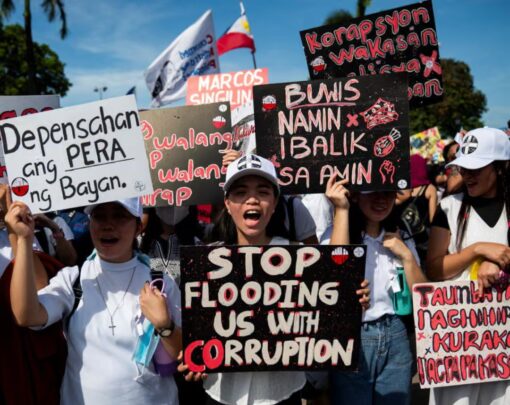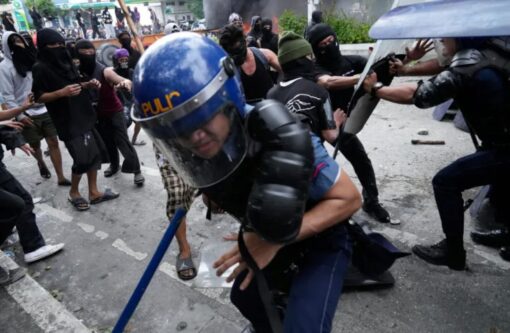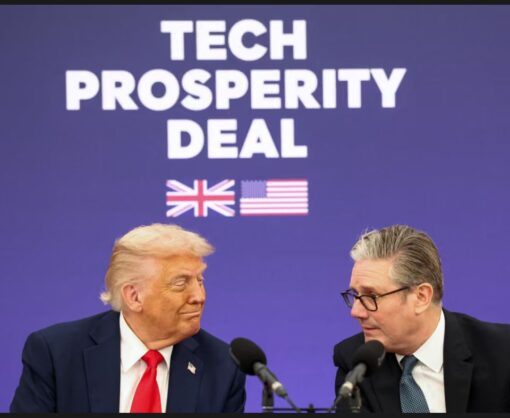The political atmosphere in the Philippines has been shaken by mass arrests following a wave of demonstrations against corruption, with authorities confirming that more than 200 people were detained during nationwide rallies.
The Philippines corruption protests have become one of the largest displays of public anger in recent years, raising fears of escalating confrontations between the government and a citizenry growing impatient with allegations of graft, misuse of funds, and political favoritism.
The protests, which spread across Manila and several provincial cities, were triggered by fresh reports of embezzlement involving government contracts and questionable spending in public infrastructure projects.
Demonstrators, many of them young Filipinos and members of civil society groups, marched with placards demanding accountability, chanting slogans calling for justice and transparency.

In several areas, the gatherings quickly turned tense, with riot police moving in to disperse the crowds. Tear gas and water cannons were reportedly deployed in Manila, where thousands had gathered near government buildings.
Witnesses described chaotic scenes as demonstrators were dragged into police vans. By nightfall, rights groups reported that more than 200 protesters had been taken into custody.
Authorities defended the arrests as necessary to maintain order, insisting that the rallies had violated public assembly laws and endangered public safety.
Yet critics argue that the crackdown exposes the government’s deep discomfort with a growing movement that is openly challenging its credibility.
One activist who escaped arrest said the public had lost patience with promises of reform that never materialize. “Every year we hear speeches about fighting corruption, but the scandals keep piling up.
The people are no longer afraid to speak out,” he declared. That sentiment echoes across social media, where hashtags connected to the Philippines corruption protests have trended for days, amplifying the voices of those who feel betrayed by a system they describe as broken.
International watchdog groups have long criticized the Philippines for failing to tackle graft effectively.
Transparency International consistently ranks the country low on its corruption perception index, with surveys revealing widespread mistrust of political leaders.
The latest protests erupted after an investigative report alleged that millions of pesos had been siphoned off through “ghost projects” linked to powerful officials.
These revelations have reignited old frustrations, particularly among younger citizens who feel the government has repeatedly failed to deliver on promises of reform.
The arrests have drawn condemnation from rights organizations and opposition figures who accuse the administration of weaponizing security forces to stifle dissent.
A former senator warned that detaining peaceful demonstrators would only strengthen the resolve of the movement. “These young people are fighting for the future of the country. By arresting them, the government is admitting it fears the truth,” he said.
The administration, however, insists it remains committed to transparency. A presidential spokesperson defended the police response, stating that while citizens are free to express their grievances, protests must remain lawful and orderly.
He added that corruption allegations would be investigated “through the proper channels” and cautioned against what he described as “mob justice.” That assurance has done little to calm critics who argue that the justice system itself is compromised by political influence.
Observers note that the Philippines has a long history of political scandals, and street protests have often been catalysts for major change.
The memory of the 1986 People Power Revolution, which toppled a dictatorship, still looms large in the national consciousness. Many of today’s demonstrators draw inspiration from that legacy, believing that sustained public pressure is the only way to force accountability.
The Philippines corruption protests have already reignited discussions among academics and civil society leaders about the role of civic engagement in a democracy where institutions are perceived to be weak.
Economic concerns have also fueled public anger. Rising inflation and stagnant wages have left many Filipinos struggling to make ends meet, and revelations of large-scale graft deepen the sense of injustice.
Protesters argue that corruption diverts resources away from critical services such as healthcare, education, and infrastructure, worsening inequality and leaving millions vulnerable.
A shopkeeper who joined the march in Quezon City said he was tired of watching politicians enrich themselves while ordinary people suffer. “We work hard and pay taxes, but our money disappears. This is why we are on the streets,” he said.
The government’s response will likely shape the trajectory of the protests in the weeks ahead. Analysts warn that heavy-handed crackdowns risk further alienating citizens and could spark larger demonstrations.
“Once people see their friends and neighbors arrested for speaking out, it can either silence them or push more to take to the streets,” explained a political science professor in Manila. He suggested that the administration must balance law enforcement with genuine dialogue if it hopes to calm the growing unrest.
Regional and international reactions have been swift. Human rights groups across Southeast Asia expressed solidarity with the demonstrators, urging Philippine authorities to release detainees and respect the right to peaceful assembly.
The United Nations Human Rights Office also issued a statement reminding the government that citizens have a protected right to protest, warning that excessive use of force could damage the country’s global standing.
Western embassies in Manila expressed concern, with one European diplomat describing the arrests as “a troubling signal” about the health of democratic institutions in the Philippines.
Despite the government’s tough stance, momentum appears to be building among civil society networks. Student organizations, religious groups, and professional associations have announced plans for solidarity marches in the coming weeks.
Online campaigns calling for the release of detained activists are also gaining traction, spreading beyond the Philippines and drawing attention from diaspora communities abroad. Activists argue that the government cannot suppress a movement that represents the anger of millions.
For now, the detained protesters face possible charges ranging from illegal assembly to disturbing the peace. Human rights lawyers are preparing to challenge the arrests in court, describing them as politically motivated.

Legal experts argue that the broad application of public assembly laws has often been used to intimidate critics of the government. Whether the judiciary will side with the demonstrators remains uncertain, but the trials could become another battleground in the fight over accountability.
As the situation unfolds, ordinary citizens remain deeply divided. Supporters of the administration argue that the protests are destabilizing and that allegations of corruption should be handled through institutions, not the streets.
Critics counter that institutions have repeatedly failed and that mass mobilization is the only way to expose wrongdoing. What is clear is that the Philippines corruption protests have shaken the political establishment and rekindled a national debate about democracy, transparency, and the rights of citizens.
The coming weeks will be crucial in determining whether the protests fizzle out under the weight of arrests and intimidation or whether they evolve into a larger movement capable of forcing reforms.
For a country that has seen both the collapse of dictatorship and the endurance of democratic resilience, the outcome of this latest struggle will help define the next chapter of its political journey.
What began as an outcry against corruption has become a test of the Philippines’ commitment to democratic freedoms, and the arrest of more than 200 demonstrators has only deepened the sense that the battle for accountability is far from over.


